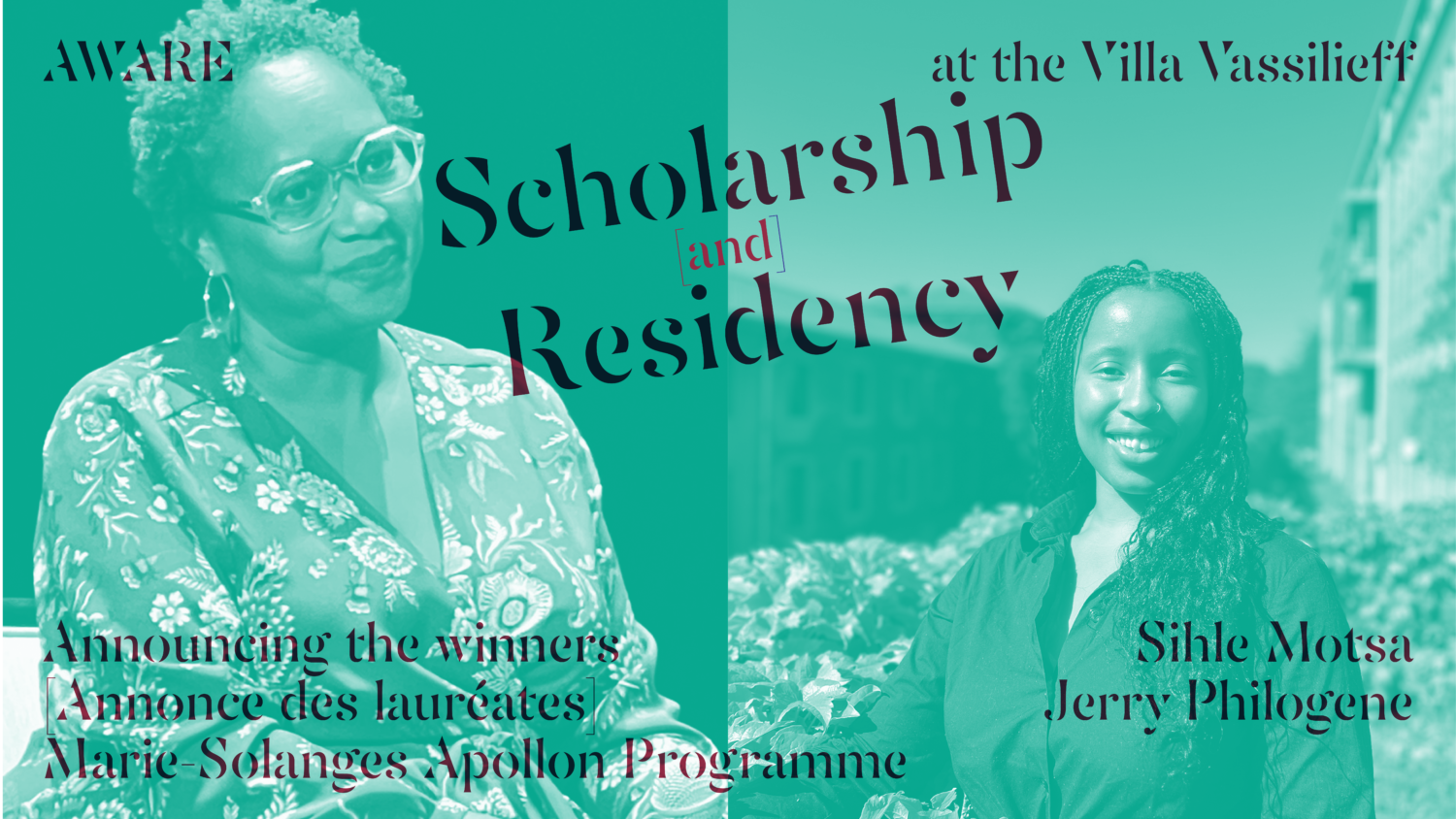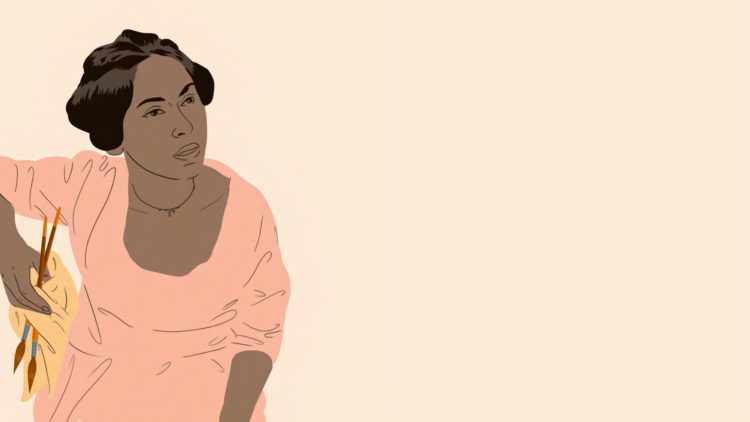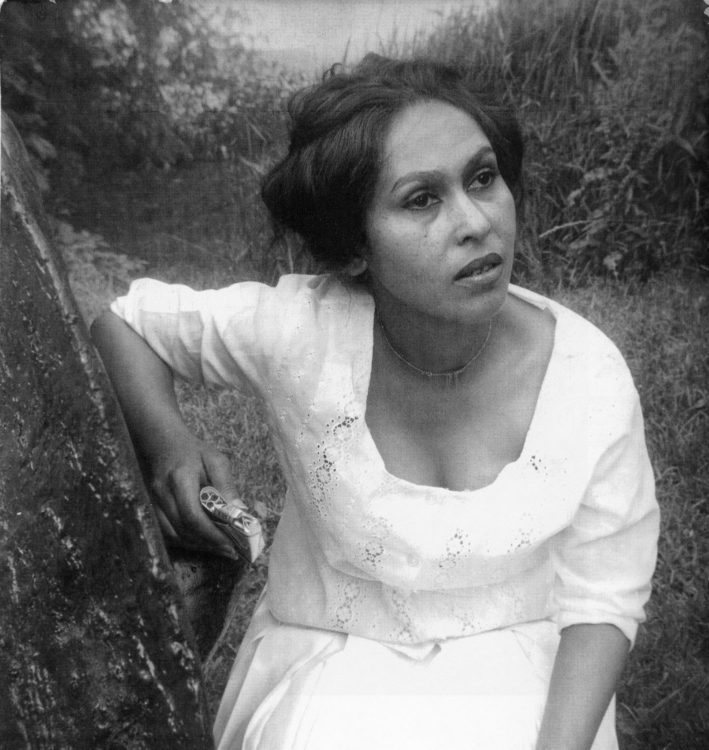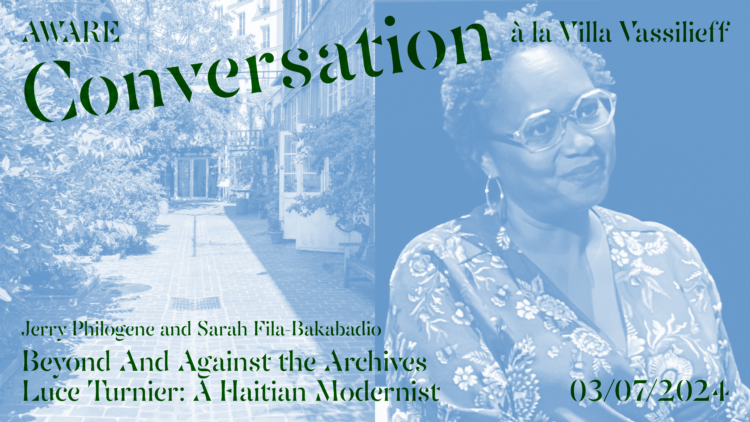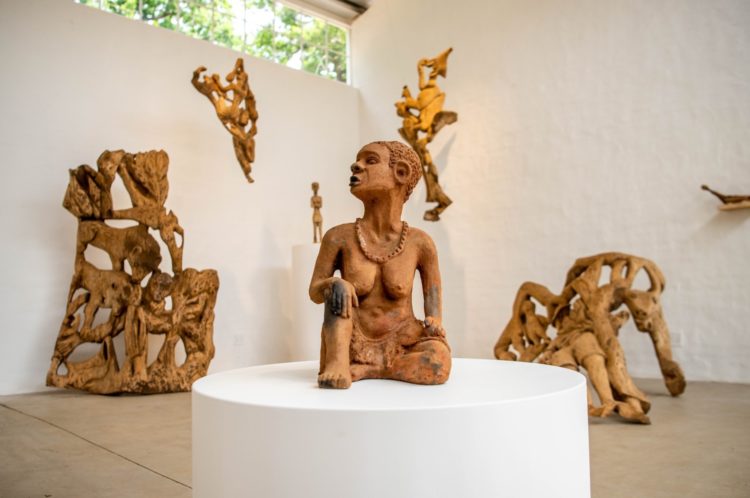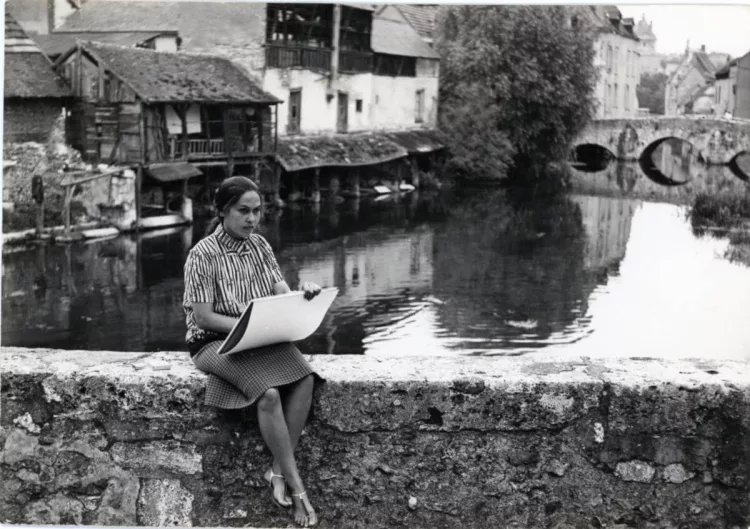Researcher-in-Residence
Photo on the left by Deborah Jack, design par Lisa Sturacci studio, © AWARE : Archives of Women Artists, Research & Exhibitions
With the project proposals entitled “Beyond the Archives and Vodou Iconography: Luce Turnier, A Feminist Modernist in Haiti and Paris” and “A Violent Sublime: Women’s Articulation of and unsettling societal order”, Jerry Philogene and Sihle Motsa are the winners of the first edition of the Marie-Solanges Apollon programme. The programme, supported by artist Manuel Mathieu, aims to promote research into transcultural artistic practices, drawing inspiration from Paul Gilroy’s Black Atlantic and Global South concepts. A new call will be launched in summer 2024.
“Congratulations to the first winners of the Marie-Solanges Apollon programme! This research is fundamental to the preservation and emancipation of our collective imagination. I hope this programme will highlight and encourage the valuable contribution of these researchers on an international scale.”
Manuel Mathieu, artist
• Research residency winner: Jerry Philogene
Jerry Philogene’s project “Beyond the Archives and Vodou Iconography: Luce Turnier, A Feminist Modernist in Haiti and Paris”, situates Luce Turnier (1924-1994) as an artist engaged in the visual experimentation and aesthetic nuances of Black modernism. L. Turnier’s monochromatic and muted abstract portraits of working-class Haitian women as well as her still-life and landscape paintings and drawings capture the aesthetics, the symbolic and material forms of Haiti informed, in part, by her artistic training in the U.S. and Paris. J. Philogene’ examination of L. Turnier’s work pays close attention to her use of pose, color gradation, form, and representation to underscore the power and potentiality of her portraits as conceptual provocateurs of a feminist ethos within formal modernist aesthetic practices and the complex nature of representation of Black people. Her interdisciplinary and transnational analyses of L.Turnier’s practice challenge the male-centric narrative of modern Haitian art. Most importantly, this project is part of social art history and Black feminist art history as well as an archival excavation of the life and creative practices of an underrepresented female Haitian artist. Jerry Philogene’s intervention will frame L. Turnier’s work within a modernist discourse and highlight her contributions in creating a transatlantic visual aesthetic that reframes an African diasporic art historiography, which includes Haiti’s cultural, aesthetic, and ideological contributions to Black intellectual thought and culture. She is also interested in exploring the cultural interactions and connections between Turnier and the various African and Caribbean artists she met while living and working in Paris during the 1950, 1960s, and 1970s.
Jerry Philogene is Associate Professor and Director of the Black Studies Program at Middlebury College. Prior to going to Middlebury, she was Associate Professor in American Studies Department at Dickinson College, where she specialized in interdisciplinary American cultural history, art history, and visual arts of the Caribbean and the African diaspora with an emphasis on the Francophone Caribbean. Dr. Philogene is an independent curator. In 2023, she co-organized with Dr. Katherine Smith the Myrlande Constant: The Work of Radiance, an exhibition on the contemporary textile works of Haitian artist Myrlande Constant, Fowler Museum, UCLA. Dr. Philogene is the recipient of a 2020 Andy Warhol Foundation Arts Writers Grant for her book manuscript The Socially Dead and Improbable Citizen: Visualizing Haitian Humanity and Visual Aesthetics.
• Research grand winner: Sihle Motsa
The research project developed by Sihle Motsa as the recipient of the Marie-Solanges Apollon Scholarship looks at the mythologies generated by KwaZulu-Natal’s ecopolitical configuration through Noria Mabasa’s artistic lens. N. Mabasa’s sculptural works, Carnage One and Carnage Two, were created as an ode to the people of KZN, who in 1987 faced harrowing devastation from torrential floods. These works, when approached with reverence for the African cosmogenic expanse and an intuitive understanding of the geo-political factors that construct and contain the possibilities of blackness, might be recognised as an astute reading of the sublime quality of violence and ecological degeneration in Kwazulu-Natal. It contends with the political and ecological scene, asking how N. Mabasa’s representations, embody the cyclical nature of both violence and climate injustice.
Sihle Motsa is an Art Historian and Art practitioner who earned her master’s in art history at the University of the Witwatersrand. She has worked as a lecturer, researcher, and writer, authoring texts for the Daily Maverick, Artthrob, Atlantica Contemporaries, among others. She has curated exhibitions that speak to a myriad of themes including black material cultures, ecological vernaculars, and black women’s artistic practices. She is currently pursuing a second master’s degree with the Department of Historical Studies at the University of Cape Town.
The selection committee for the 2023-2024 edition of the Marie-Solanges Apollon programme was composed of:
Françoise Vergès is an author, independent curator, decolonial feminist activist and Senior Fellow Researcher at the Sarah Parker Centre for the Study of Race and Racialization, UCL. She publishes on the aftermath of slavery and colonialism, the decolonization of museums and the arts, decolonial feminism and the racial capitalocene. Her latest publication is Programme de désordre absolu, Décoloniser le musée (2023).
Marie-Ann Yemsi is a contemporary art consultant and independent curator. She develops multidisciplinary projects at the intersection of visual arts, performance, dance, music, sand writing. Her research and exhibitions focus on collaborative artistic practices and experimental forms, particularly those developed by women artists from the different perspectives of the global South, highlighting themes of memory, history, gender, and identity in relation to the political, social, and ecological issues of today’s world.
Nina Volz and Louise Thurin for AWARE
